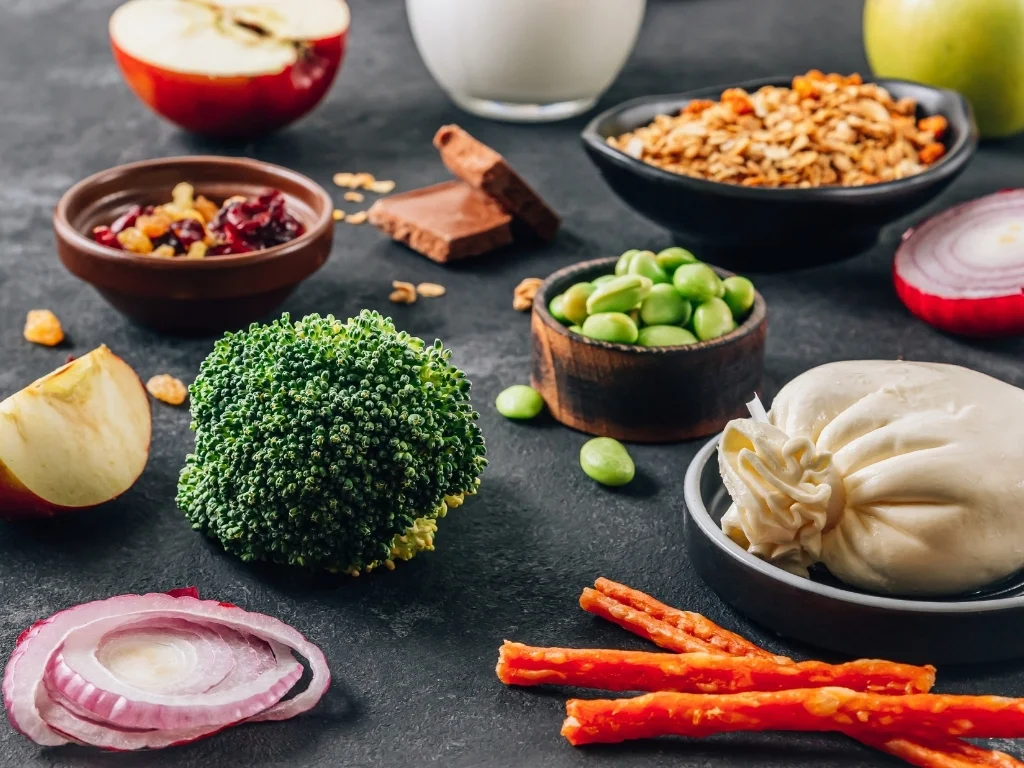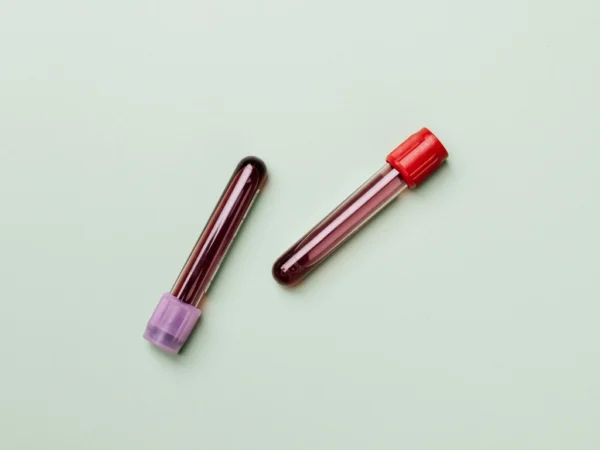Menopause is a completely natural stage of life, but that doesn’t mean it’s easy. The hormonal shifts it brings often come with symptoms that can be intensified by the natural effects of aging.
While these changes can make anyone feel overwhelmed, there are proven ways to ease them. Good nutrition, in particular, is one of the best tools to leverage.
By knowing what to eat during menopause and adding nourishing food choices into your routine, you’d not only make this phase much more manageable; you can also enjoy better health, more sustained energy, and renewed confidence for the years ahead.

Why should you mind what to eat during menopause?
Adjusting your diet is crucial for navigating the major changes your body undergoes during menopause. As estrogen levels decline, your metabolism naturally slows to the extent that you burn about 250 to 300 fewer calories each day, even if you stay physically active with no significant increase in your food intake.
This metabolic shift, paired with the body’s tendency to store more fat around the abdomen as you age, makes weight gain more likely for menopausal women. In fact, research shows that women may gain about 1.5 pounds each year in their 50s.
Managing weight is not the only reason why your food choices matter at this stage. Menopause symptoms — from hot flashes and night sweats to mood swings, low energy, fatigue, and poor sleep — can affect daily life, and many of them are influenced by diet and lifestyle.
On top of this, lower estrogen causes muscles and bones to gradually lose mass, which raises the risk of falls and osteoporosis. At the same time, changes in cholesterol and insulin sensitivity can increase the chances of heart disease and type 2 diabetes.
These compounding risks and effects can all be managed by taking active steps to improve your lifestyle. One effective way to achieve this is to adopt healthy eating for menopause.
What to eat during menopause, according to dietitians
When planning what to eat during menopause, nutrition experts recommend maintaining a balanced approach that doesn’t cut out entire food groups but rather emphasizes nutrient-dense options.
The following are some foods to eat to help with menopause symptoms and long-term health:
1. Whole grains
Whole grains such as oats, quinoa, brown rice, and whole-wheat bread are rich in fiber, B vitamins, and magnesium. Fiber is especially valuable when it comes to regulating digestion, which means consuming high-fiber foods can keep you full for longer and keep cravings at bay.
Integrating whole grains into your diet doesn’t have to take huge changes. For example, you can easily swap white rice for brown rice or opt for whole-grain wraps when making sandwiches.
2. Healthy fats
Unsaturated fats, especially omega-3s, are powerful allies for heart and joint health. They also help address achy joints and other symptoms caused by inflammation. Good sources of healthy fats include olive oil, walnuts, oily fish like salmon and mackerel, and seeds like flax and chia.
3. Dairy
Calcium and vitamin D are essential to counteract bone and muscle loss accelerated by lower levels of estrogen. Adding dairy products like yogurt, milk, and cheese to your menopause meals is an excellent way to get both, since these food items tend to be fortified with vitamin D and are versatile — whether used to top some vegetables, blended into smoothies, or added into dishes for depth of flavor.

4. Plant-based dairy alternatives
If you prefer dairy-free options, you can use fortified plant-based options such as soy milk, oat milk, almond milk, or calcium-set tofu as your alternatives. These food options all contain phytoestrogens, which are plant compounds that mimic estrogen’s effects in the body.
While further research is needed to understand their effects on menopause symptoms, there’s reason to believe that phytoestrogens may reduce hot flashes in certain cases and even support bone health and prevent certain cancers.
Other sources of phytoestrogen include licorice root, broccoli, carrots, oranges, legumes, and seeds.
5. Quality protein
Protein-rich foods help preserve the muscle mass that age and slower metabolism can naturally compromise. Add lean meats, poultry, fish, eggs, beans, lentils, and nuts to your growing list of what to eat during menopause.
Try to spread your protein intake throughout the day. For instance, have eggs for breakfast, try chicken or chickpeas for lunch, and eat fish or lentils at dinner.
6. Seeds
Seeds like flaxseeds, chia seeds, or sunflower seeds also contain lignans and fiber that help balance out hormones. This makes them great foods for menopause as they ease symptoms like hot flashes while supporting both heart and brain health.
7. Fruits and vegetables
Packed with antioxidants, fiber, and essential nutrients, fruits and vegetables are ideal for improving heart health, digestion, and hormone balance. Their natural potassium content can also regulate blood pressure.
When it comes to what to eat during menopause, adding more color to your plate can be a useful general guide. A variety of protective nutrients from fresh fruit, leafy greens, carrots, or bell peppers will certainly make for a hearty dinner.
8. Legumes
If you’re not particularly fond of red meat, substitute it with beans, lentils, and chickpeas to support meeting your protein needs. Because they’re also rich in fiber and iron, these foods can boost energy and support gut health. Consider adding lentils to soups, making chickpea salads, or stirring beans into casseroles for some filling, satisfying, and meat-free meals.
Foods to limit during menopause
Learning what you can eat during menopause may be essential to symptom relief, but another key part is to be mindful of what not to eat.
Let’s dive deeper into menopause and the foods to avoid or limit:
- Spicy foods: Since these can intensify the feeling of heat, they can trigger or worsen hot flashes. Try balancing spicy foods with cooling ingredients like yogurt or cucumber.
- Alcohol and caffeine: Both are typically linked to poor, disrupted sleep and can cause other symptoms. Consider limiting your intake of coffee, tea, or alcoholic beverages, especially in the afternoon and evening.
- Refined carbs and starchy foods: White bread, pasta, rice, and potatoes can cause blood sugar spikes that make regulation difficult during menopause. In the long run, eating refined carbs regularly may lead to weight gain.
- Processed foods: Some packaged snacks, frozen meals, and fast food items can contain high amounts of refined sugar, fat, and sodium. Beyond contributing to weight gain, they can also increase blood pressure and raise the risk of heart disease.
While you don’t need to remove these items completely from your diet, you should consume them in moderation to see positive effects on your health and energy.
Nevertheless, everyone’s body responds differently, so it can also be beneficial to track any patterns between how you feel and what you eat during menopause by keeping a food journal and symptom log.

Thrive through menopause with expert dietitian guidance
How you experience menopause can vary greatly, and lifestyle choices play a huge role in shaping that journey. The key is learning what to eat during menopause and making those foods an organic part of your daily routine.
While this guide provides you with the basics, working directly with a registered dietitian offers personalized, hands-on support, which can help you navigate this challenging time much more successfully.
At Health Loft, our providers create nutrition plans tailored not only to your symptoms but also to your medical history, lifestyle, preferences, and goals. Along with practical nutrition guidance, they provide accountability and the right tools to support your health — without the pressure of strict restrictions.
Many of our providers are also in-network, which means you can access care without added financial strain, depending on your coverage. Connect with a menopause dietitian at Health Loft today and get the support you need to navigate this stage of life with confidence.
This article was reviewed by Adrienne DePaul, MS, RDN. It is intended for informational purposes only and does not replace personalized nutritional advice.














